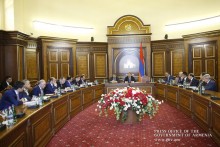News
PM: “Shifting from consumption-based to export-driven economic growth”
02.08.2016

Prime Minister Hovik Abrahamyan chaired a consultative meeting, which discussed the economic results recorded in the first half of 2016 and outlined future action.
Addressing the meeting, the Prime Minister stated in part, “Early this year, Armenia had to face several challenges arising from the socio-economic situation and national security threats. Exasperated by adverse economic pressures that emerged in the main partner countries in 2015, the external logistics bottlenecks and the economic slowdown around the world had been putting threats to the prospects for economic growth in Armenia.
However, based on the results of the first half-year, we can state some progress even against the background of falling prices: 4.4% economic growth was achieved in the first quarter of this year, while the index of economic activity rose to 4.8% in January-June as compared to the same period last year.
In 2015, owing to the Government’s anti-cycling policy and quick-responsiveness to emerging challenges, the negative shocks were completely absorbed by the economy and were thereby prevented from continuing into 2016. According to experts, the population’s real incomes might have fallen by 20-30% due to external shocks if it were not for the Government’s well-advised policy.”
The Premier underscored that the impact of the Government’s export-oriented policy could be seen already. In his words, the Government was seeking to boost economic growth through enhanced exports by coupling it with efforts aimed at curbing the negative balance of trade. Hovik Abrahamyan added that foreign trade turnover revitalization was triggered by increased real output, which in the first half of 2016 amounted to 8.9%, where manufacturing industry grew by 105.1%, while mining industry and opencast mining increased by 118.8 %.
“Armenia’s negative balance of trade continues to decline. Note that unlike 2015, when the trade deficit shrank due to low imports, it has been tending down owing to increased exports in 2016.
Thus, according to the first 6 months’ data of 2016, commodity exports boasted a 16.7% growth, while imports started to recover with only 3.7 percent fall recorded in the same period. Actual exports increased by about USD116.6 million, while imports decreased by some 56 million dollars. During the first 5 months of 2016, a sharp increase in exports was stated in precious and semi-precious stones, finished food products, textiles and products of vegetable origin.
It can be stated that notwithstanding Armenia’s downturn in domestic consumption, economic growth was fostered by foreign trade over the past one and a half years, which means a qualitatively new type of economic growth: we are shifting from the consumption-based to export-driven economic growth,” the Prime Minister said, adding that the aforementioned changes may usher in long-term transformations in the economy.
“Efforts need to be made so that the possibility of such transformations could be translated into reality. At the same time, I must underscore that the above positive changes do not mean at all that we should stop there.
There are numerous problems requiring urgent solution. The present achievements should only serve as a basis for further reform and a comprehensive development policy.
Today of paramount importance are the business environment, the reduction of corruption risks as far as possible, the identification and development of new competitive advantages, as well as the mastering of new sales markets for Armenian products and the strengthening of our positions on the existing markets.
In conclusion, I can state that notwithstanding the risks still available, economic developments seem to be quite favorable, and our key medium-term objectives should be as follows: build on the current achievements, consistently monitor and eliminate risks, as well as ensure the most inclusive economic growth,” Hovik Abrahamyan emphasized.
Stressing the need for a joint effort aimed at solving the existing problems, the Premier noted that the Government will continue to cooperate with political forces, civil society taking note of public proposal and approaches.
During the consultation, there has been a keen exchange of views, during which the heads and representatives of relevant ministries and government agencies came up with recommendations concerning the development of various sectors of the economy, trade turnover, including the growth in exports and investments, the further improvement of the business environment. Dwelling on the existing problems, the speakers discussed ways of finding possible solutions.
